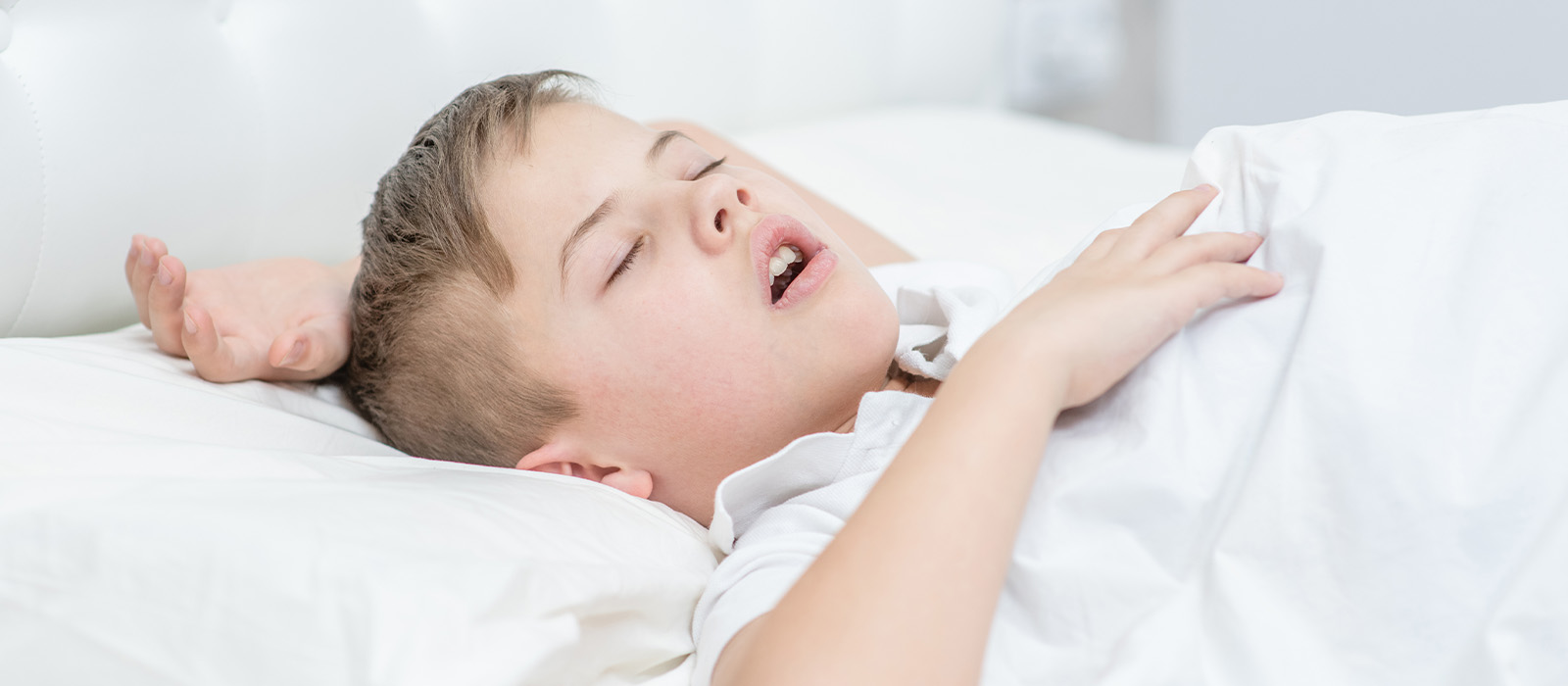Sleep Apnea/Sleep-Disordered Breathing

At the Michigan Tongue-Tie & Airway Center, we understand how vital restorative sleep is for growing children. If you’ve noticed signs that your child may be struggling with sleep apnea or other sleep-disordered breathing, our pediatric tongue-tie dentist in Okemos, MI, is here to help uncover the root cause and guide you toward lasting solutions.
We also encourage you to take our online quiz if your child is showing signs of sleep-disordered breathing.
What Is Pediatric Sleep-Disordered Breathing?
Pediatric sleep-disordered breathing refers to a range of nighttime breathing issues that reduce airflow and oxygen levels in children. While snoring may seem harmless, it can be the first indicator of a more serious airway problem.
Sleep-disordered breathing impacts not just a child’s sleep but their daytime performance, mood, and long-term health. It may be triggered by anatomical issues like tongue-ties, enlarged tonsils, or jaw underdevelopment—all of which can be assessed and addressed by airway-focused providers.
More than 1 in 4 children may have some type of sleep-disordered breathing, with up to 5% having the most serious type (sleep apnea).

Types of Pediatric Sleep-Disordered Breathing
Sleep-disordered breathing exists on a spectrum and can range from mild to severe:

-
Snoring
Common, but not necessarily benign. It may indicate resistance in the airway. If you are concerned about your child’s risk for sleep-disordered breathing, schedule a consultation with our pediatric tongue-tie dentist in Okemos, MI.
-
Upper Airway Resistance Syndrome (UARS)
Increased effort to breathe, even without full apnea episodes. Some health care providers may describe upper airway resistance syndrome as part of .
-
Obstructive Hypopnea
Partial airway blockage leading to shallow breathing and oxygen drops. Some health care providers may describe obstructive hypopnea as part of pediatric obstructive sleep apnea.
-
Obstructive Sleep Apnea (OSA)
Repeated episodes of complete or near-complete airway obstruction during sleep. The most common sources of obstruction are tongue-tie, enlarged tonsils and/or adenoids, and fat deposits on the neck.
-
Central Sleep Apnea (CSA)
With , the brain fails to signal the respiratory muscles to breathe. It is the most common in infants, especially those born prematurely whose brains may be underdeveloped. CSA may also be caused by brain injuries and certain types of brain malformations.
Each type deserves attention, especially if paired with daytime symptoms that affect your child’s health or development.
Signs of Sleep-Disordered Breathing
Does your child snore? Do they struggle with focus or behavior during the day? You may be witnessing signs of pediatric sleep-disordered breathing.

Common symptoms of sleep-disordered breathing include:
Snoring
Bed-wetting
Nightmares or night terrors
Academic struggles or learning challenges
Behavioral problems
Slow growth
Unhealthy weight gain
Hyperactivity (including diagnosed ADHD)
Low energy
These signs can often be misattributed to behavioral or learning disorders, which is why a thorough airway evaluation is crucial.
Treatment Options
At the Michigan Tongue-Tie & Airway Center, we take a comprehensive and child-centered approach to treatment.

Depending on your child’s specific needs, management options may include:
-
Myofunctional Therapy
Exercises that strengthen the tongue and facial muscles to promote nasal breathing.
-
Oral Appliances
Devices that gently reposition the jaw and improve airflow.
-
Laser Tongue-Tie Release
Dr. Ramaswami offers laser tongue-tie release in Okemos, MI. This procedure is not only completely safe, but can be performed right in our office.
-
Orthodontic or Orthopedic Intervention
Early expansion can support airway development and jaw alignment.
-
ENT Referrals
Surgical evaluation for enlarged tonsils or adenoids.
-
CPAP Therapy
Reserved for more severe cases of obstructive sleep apnea.
Ensuring your child receives the proper treatment for sleep-disordered breathing can make a world of difference. Watch Valerie Deegan’s story about her son, Connor, to learn more.
By tailoring care to each child, Dr. Ramaswami aims to support both immediate symptom relief and long-term growth.
Short & Long-Term Health Effects
When left unmanaged, pediatric sleep-disordered breathing can lead to complications that extend far beyond restless nights.
Immediate effects often mimic ADHD or mood disorders and may include:
- Behavioral problems
- Hyperactivity
- Learning difficulties
- Low mood and depression
Long-term consequences may include:
- Orthodontic issues
- Failure to thrive
- Obesity and diabetes
- Heart problems
- Premature death
The earlier sleep-disordered breathing is addressed, the more we can protect your child’s health, confidence, and quality of life.
Schedule a Consultation for Pediatric Sleep-Disordered Breathing
Breathing and sleep are fundamental to your child’s growth, learning, and emotional well-being. If you’ve noticed signs of sleep-disordered breathing, don’t wait to seek answers. Schedule an appointment with our pediatric tongue-tie dentist in Okemos, MI. Dr. Neeru Ramaswami, specializes in uncovering the root causes behind pediatric airway issues and guiding families toward transformative outcomes. To get started, please call the Michigan Tongue-Tie & Airway Center at (517) 574-4688 or request an appointment online.

